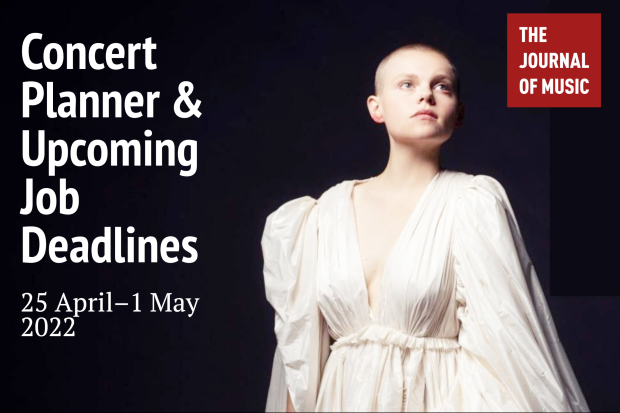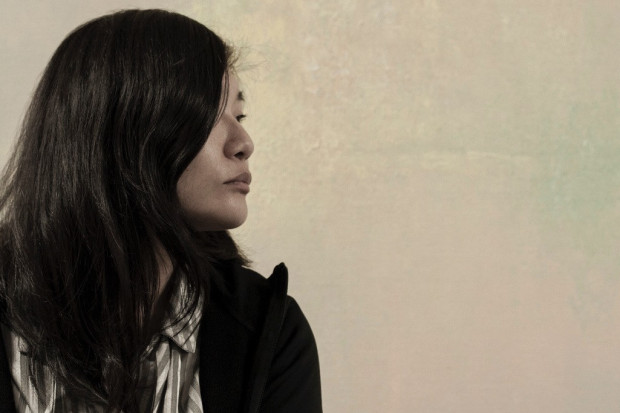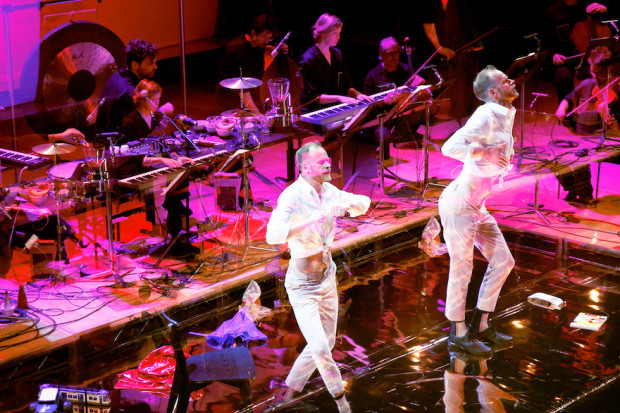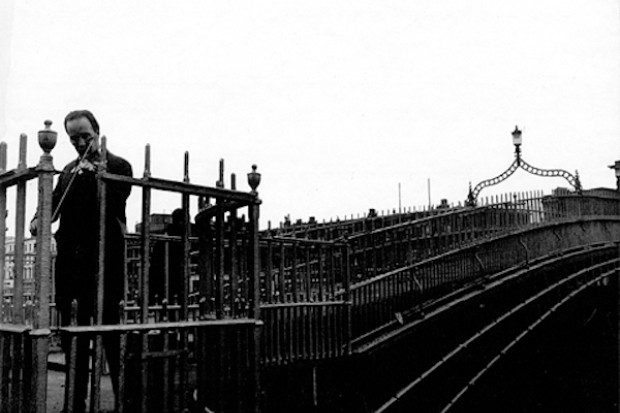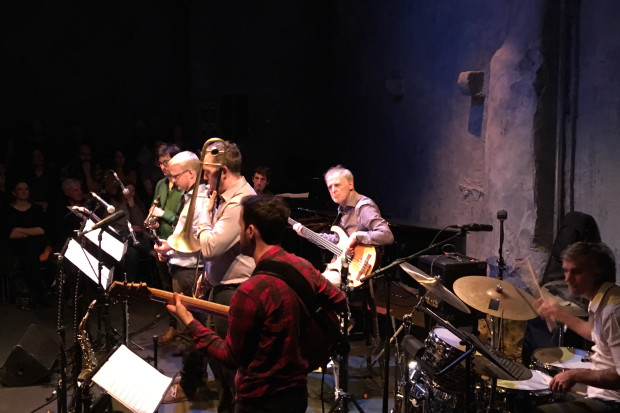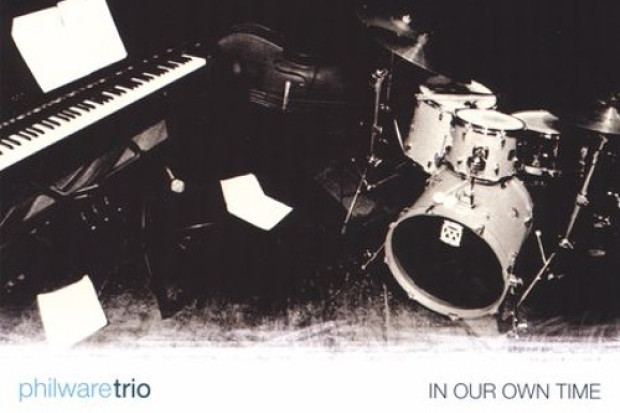MC Hill
Bray Jazz Festival, Various venues, Bray, Co. Wicklow, 28-30 April 2006
With so many jazz musicians of repute coming to Ireland these days, an event like the Bray Jazz Festival risks passing almost unnnoticed unless it offers at least one stand-out attraction. This year’s surprise offering was the Andrew Hill Quintet, who played at the Mermaid Arts Centre on the Friday night. If you had an unshakable commitment to watching Pat Kenny or were willing to be discreetly rude by sneaking out before the end, you could catch the Benjamin Dwyer/Mike Nielsen guitar duo at the Town Hall before dashing down to the Mermaid.
Having first come to attention as a performer on the classical guitar, Dwyer has in recent years steadily expanded his range as a composer. His duo with Nielsen – a leading figure on the Irish jazz scene for years – reflects something of his questing nature. Many players with classical training have been tempted by improvisation, but they may underestimate the skills involved and find themselves at a loss or resorting to inane routines when space opens in front of them or gapes under their feet. Judging from this performance, Dwyer has come through the fire.
Anyone familiar with the recent Mike Nielsen/Benjamin Dwyer CD, Evolution, will know that some of Dwyer’s Études are used as a basis for improvisation – an acute case of a composer relinquishing control in favour of the danger and stimulation of co-creation and instantaneous recomposition.
In this concert, there was no obvious sense of ownership where composition was concerned. The first few items were satisfying, if not over-exciting. It was in some of Nielsen’s compositions that the playing really caught fire, Nielsen laying down patterns or subtly shifting shape while Dwyer dug in with sometimes ferocious intent. There was both technical accomplishment and gripping drama to these performances. I was sorry to miss the final piece.
The Phil Ware Trio opened the main concert at the Mermaid. The first time I saw Ware play, he was following on from another pianist. His touch and timing were so good, it was difficult to believe he was playing the same instrument as the preceding player. Ware’s style harks back to the fifties and sixties. Ably abetted by Dave Redmond on bass and Kevin Brady on drums, he played his standards with enough loving attention to delight listeners like me who do not actively seek out this kind of music.
Andrew Hill produced landmark albums for Blue Note in the mid-sixties. What distinguishes him from some hardboppers then and some of the postboppers who have been heard in Ireland in more recent times is that he offers his players much more than a trigger for conventional improvisation: instead the players are invited to articulate sharply delineated structures and complex rhyhmic patterns. Hill’s career went rather quiet in the 70s and early 80s, but since then his music has attracted younger players. Some impressive recordings have resulted.
With no disrespect to the Phil Ware Trio, energy levels and excitement rose as the Andrew Hill Quintet launched into action, bright trumpet and alto and soprano sax lines swirling over piano, bass and drums. On the night, Hill was more a discreet master of ceremonies – sketching the spaces that others would fill in, or nudging the soloists on – than a full-blooded leader. That he took very little solo space may have been a disappointment to some of his admirers, but, as suggested above, his music is about overall design rather than musical ego.
In that regard, the two lengthy drum solos were perhaps surplus to requirements, though concert audiences expect them or are expected to expect them. This is in no way to detract from drummer Eric McPhearson’s outstanding contribution to the group sound. Bassist John Hebert was equally satisfying.
Ray Comiskey’s review in the Irish Times praised Charles Tolliver’s trumpet-playing and suggested that sax-player Jason Yarde was out of his depth. There is another way of reading these performances. Softening the angles, Tolliver’s zest and fluency drew on the melodic possibilities in Hill’s compositions. Yarde, in contrast, responded more to the structural possibilities of the material, but in a focused and imaginative fashion. These contrasting and complementary approaches happily illustrated the riches inherent in Andrew Hill’s music.
There should be other opportunities to catch Andy Sheppard, Gwilym Simcock and Stan Sulzmann, but to miss Anthony Braxton’s first-ever concert in Ireland was an unbearable prospect, so Bray gave way to Sonorities in Belfast on Saturday evening. The concert itself, the Ulster fry the following morning and a meander around the post-industrial docklands – the seeds of luxury apartment blocks just beginning to sprout through rusting machinery and piles of waste – had their fascinations. A miscalculation meant that my arrival back in Bray was some minutes late for the opening act – a performance of Ronan Guilfoyle’s Simulacrum by what seemed a fine collection of French and Irish players. I accepted my fate and sat it out, but was surprised at the number of people who wandered through the swinging doors in both directions during the performance.
Guitarist Nguyen Le’s Trio (with Renaud Garcia-Fons on bass and Patrice Heral on drums) followed. Garcia-Fons was as solid as a rock, but he was not really stretched by the music, even when his bass seemed to take on an entirely convincing oriental coloration. The drummer did all that was demanded of him, walloping his kit energetically and giving us some rock-style pseudo-drama. Nguyen Le, an accomplished and versatile performer, enjoyed himself and entertained us. During some sections, we could have been in a time-machine, with a Vietnamese Horslips meeting John McLaughlin or Santana.
The slower moments drifted harmlessly into Green Room territory. But if the variety and quality displayed in the performances mentioned here are indicative, the Bray Jazz Festival organisers have reason to be pleased with themselves. (And if there are any hair-dressers reading this, is there anything out there to rival Jason Yarde’s combination of skin-tight shaven-headedness and a small, tightly-woven upwardly spiralling, head-top hair-sculpture?)
Published on 1 July 2006
Barra Ó Séaghdha is a writer on cultural politics, literature and music.












